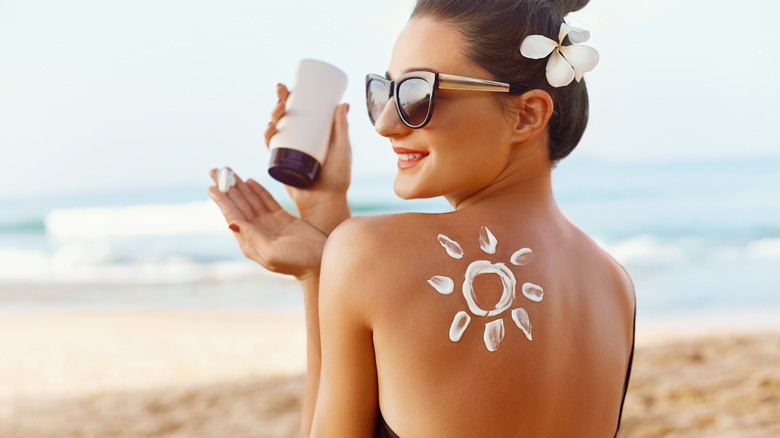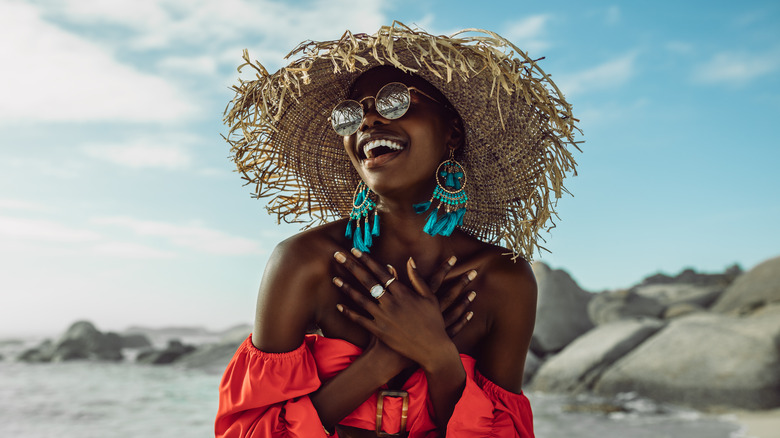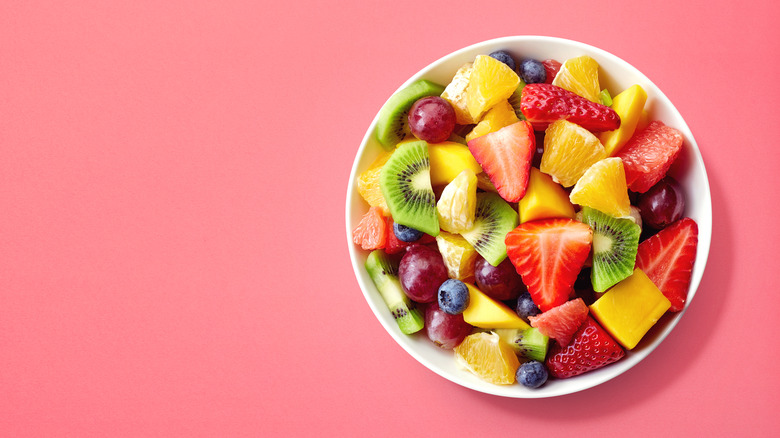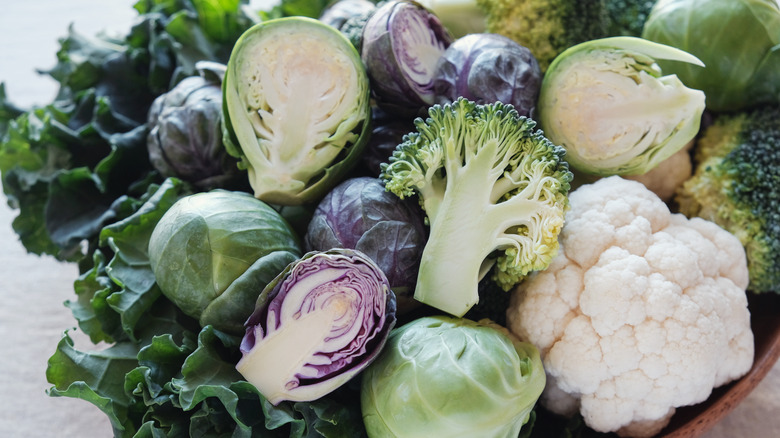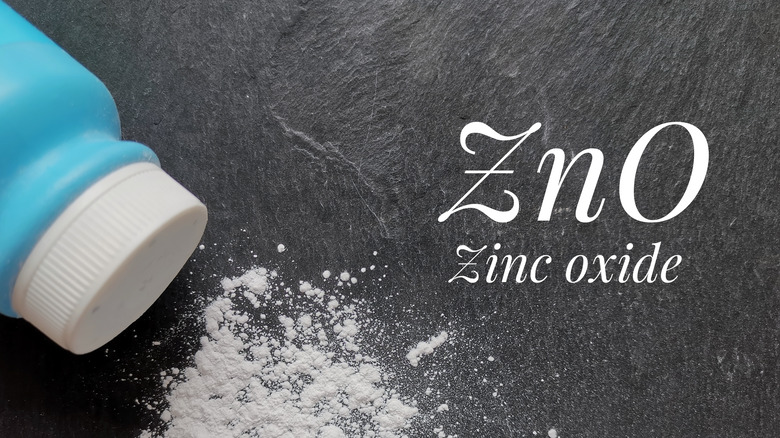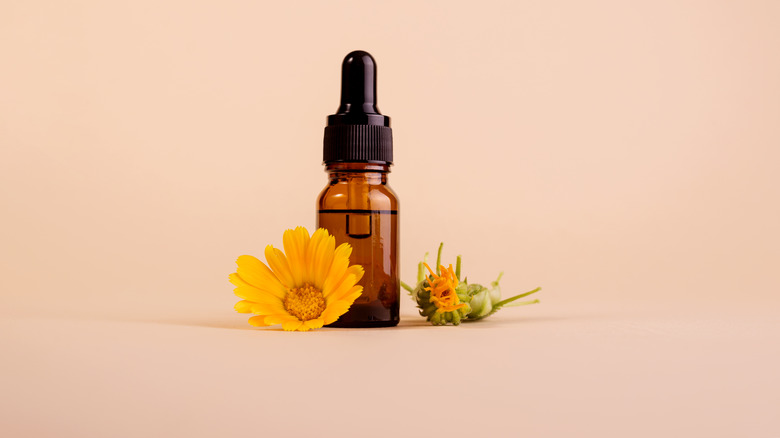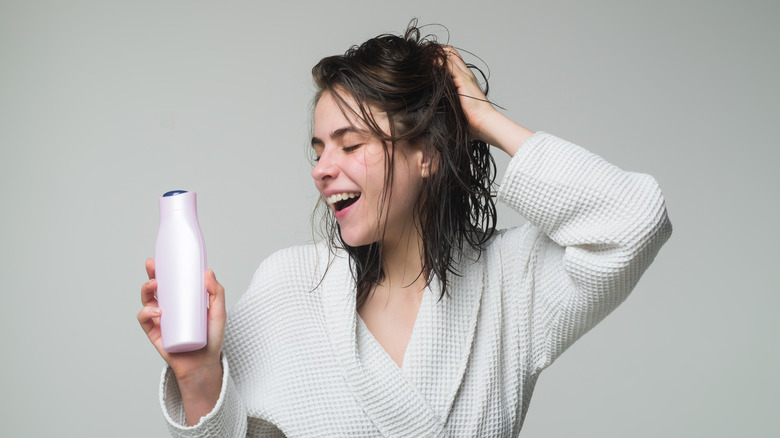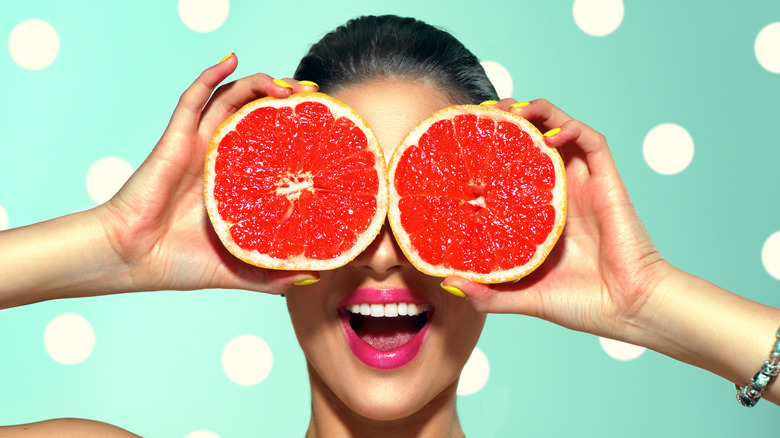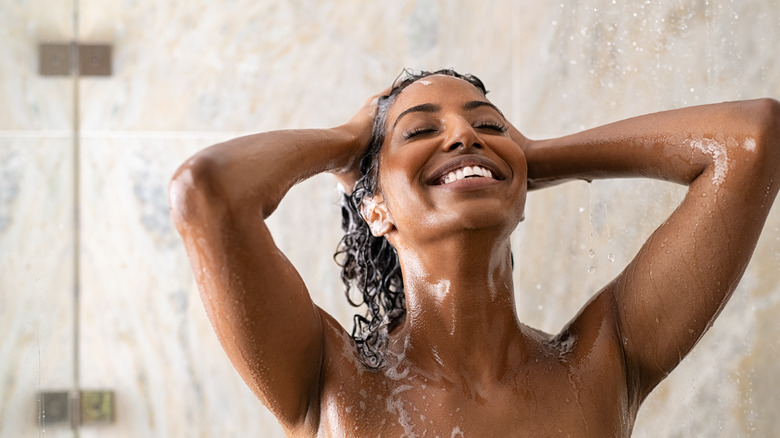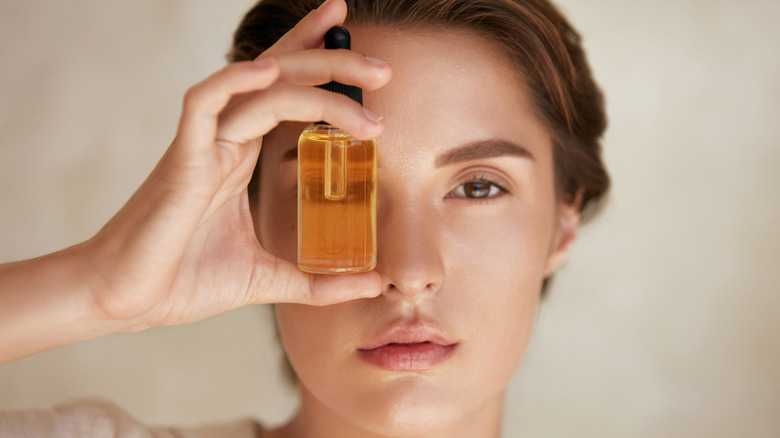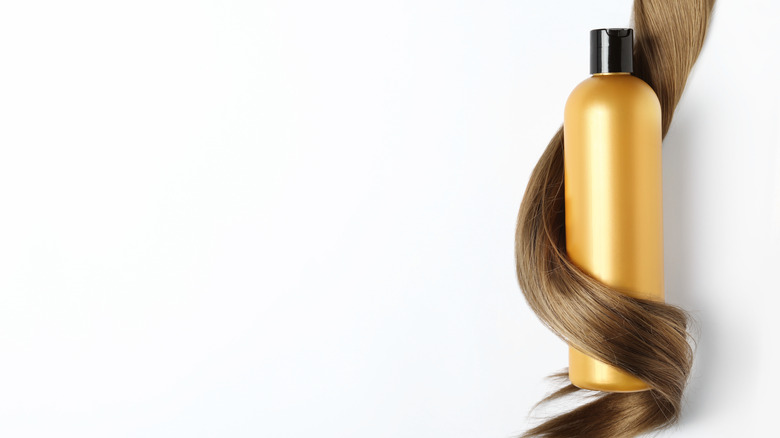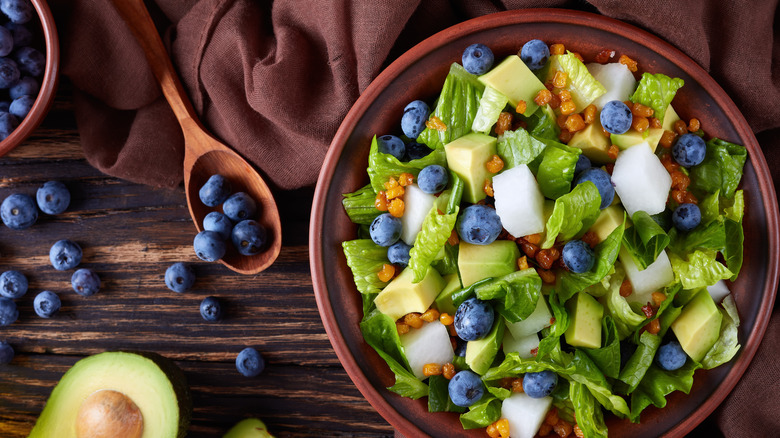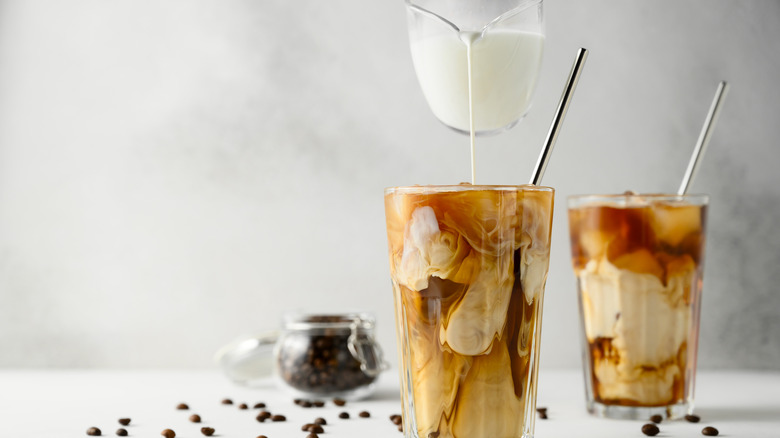How To Protect Your Skin & Hair From Sun Damage
When you were in elementary school, you probably heard from one of your teachers that it's a good idea to spend some time in the sun on a daily basis. The main reason why is because the sun is a good source of vitamin D — and when you have that in your system, it helps to strengthen your bones, boost your immune system, and decrease bodily inflammation. It even helps you to sleep better at night and can assist in preventing diabetes and certain types of cancer (via Medical News Today).
But have you ever wondered how much sun is needed in order to get these benefits? Some research says that 20-30 minutes in the summer and a couple of hours in the winter each day are more than enough. When you spend more time than that, you potentially run the risk of damaging your skin and/or hair via the ultraviolet (UV) rays from the sun. In fact, according to WebMD, 80% of what causes our skin to age is UV rays, not to mention the fact that too much time in the sunlight can cause hair to become discolored, dry and brittle.
That's the bad news. The good news is there are preventative measures that you can take to protect both your skin as well as your hair if you want to spend more time outdoors. The following tips are safe and quite effective, too.
Wear a hat to protect your hair, face and neck from sun damage
It probably goes without saying that you should apply sunscreen in order to protect your skin from UV rays. According to the Centers for Disease Control and Prevention, the level of SPF that you should use needs to be at least somewhere around 15+ (which basically means that it can protect you from around 93 percent of UV rays — via Verywell Health).
But even if you have sunscreen on, it's still a good idea to bring a hat along to cover up your hair, face and neck while you're hanging out in the sun. Since most of the skin on your body is pretty thin, that makes it pretty vulnerable when it comes to sun damage. Not only does that reality increase your chances of aging prematurely, but sunburn can make you more susceptible to skin cancer as well.
No one is saying that your cover-up has to be heavy or huge. A cute straw hat should do the trick. Whatever you decide, just make sure that you have something in tow if you plan on spending more than a few minutes outside. It can reduce premature aging on a variety of levels.
Eat yellow, orange, red and green fruits and veggies to improve your skin's ability to combat sun damage
If you're wondering what yellow, orange, red and green fruits and vegetables all have in common with one another, it's that they're full of beta-carotene. Beta-carotene is a plant pigment that helps your system to produce vitamin A, and is also a good source of antioxidants.
Some of the health benefits of beta-carotene include fighting off free radicals, reducing oxidative stress, improving cognitive function, and strengthening lungs and vision. It can even help to reduce the risk of breast and pancreatic cancer (via Healthline).
Another awesome thing about including beta-carotene in your diet is that it can also help to protect your body from sun damage from the inside out. So, whether you enjoy a fresh salad with dark leafy greens, fruits like cantaloupe and apricots, or red and yellow peppers — eat up! All are delicious and can help to keep your skin in good condition.
Cruciferous vegetables contain sulforaphane, which fights off UV damage
Cruciferous vegetables are veggies that belong to the cabbage family. Some of the foods that fit the bill include broccoli, cauliflower, arugula, kale, collards and turnips. These types of foods are really good for you because they are full of fiber, antioxidants, beta-carotene, folate and vitamins C, E and K.
As far as health benefits go, cruciferous vegetables contain anti-inflammatory properties, can reduce your risk of heart disease, will help to strengthen your immune system, can decrease your risk of cancer and, thanks to their fiber content, can help you if you're currently on a weight loss journey.
The reason why it couldn't hurt to have some fresh coleslaw or arugula salad when you've having lunch outdoors is that a sulfur-rich compound called sulforaphane is found in these vegetables (via Healthline). Studies suggest that this compound can help to protect skin from UV radiation when it's applied topically or when it's consumed. So, if you've always liked cruciferous veggies, now you've got just one more reason to enjoy as many of them as you'd like, especially when you're basking in the summer sun.
Don't forget to apply zinc oxide to your scalp
Your scalp is the foundation of your hair, right? This means that when it comes to protecting your tresses from sun damage, you've got to take this part of your body into consideration, too. This is where zinc oxide can come in handy. According to WebMD, it's an ingredient that forms a bit of a barrier for your skin in order to protect it from irritants and moisture.
Although zinc oxide is oftentimes seen in diaper rash treatments or products that help to heal burns and wounds, it's pretty common for it to be an ingredient in sunscreen as well. This is good to know, because if you apply it to your scalp while parting your hair and around your hairline, it can serve as a proactive shield so that your scalp isn't damaged by the sun. There are also hair products specifically formulated to product your hair and scalp from the sun (more on that later).
Another benefit of zinc oxide is that it typically works well on sensitive skin. Just make sure to avoid getting it into your eyes and that you run it by your doctor, should you have any questions.
Using marigold essential oil can assist in shielding your skin and hair from damaging sun rays
Just for the record, another word for marigold essential oil is calendula. Thanks to its anti-fungal, anti-inflammatory and antibacterial properties, this oil is great when it comes to fighting acne, healing wounds, soothing skin conditions like eczema, and even treating diaper rash.
However, it's also thought to provide sun protection. A 2012 study revealed that marigold oil contains SPF properties when it's in the form of a cream mixture (via Healthline). This type of oil also might help to decrease melanin formation, which can lead to brighter skin, if that's something you're looking for (via Byrdie).
That said, it should go on record that there are still studies being conducted on this oil. This means that you should probably still apply a commercial brand of sunscreen if you plan on being outside for a considerable amount of time. But if you're into essential oils and you were wondering which ones are helpful in this area, marigold is certainly one that tops the list.
Apply a leave-in conditioner that contains dimethicone to shield your strands
According to Byrdie, there are a few reasons why you should apply a leave-in conditioner to your hair (even if you've already conditioned it). Leave-ins help to give your hair an extra "boost" of nutrients and lock in extra moisture. Leave-ins also make it easier for you to detangle your strands. As it pertains to this article, though, probably the best thing that a leave-in conditioner does is protect your hair from heat damage.
This doesn't just include heat styling tools like blow dryers and flat irons either. If you get the kind of leave-in that contains the ingredient dimethicone, that's another step that you can take to protect your hair from the sun.
Vogue shares that dimethicone is a kind of silicone that helps to seal your hair's cuticles so that they're less vulnerable to UV rays. The key is to make sure that you don't use so much of it that product build-up occurs because, over time, silicone can make hair hard and brittle (via mindbodygreen). That said, so long as you take on the "less is more" approach, a leave-in conditioner with dimethicone in it can be one more way to keep your tresses in pretty good shape.
Preparing foods that are high in vitamins A and C can produce more melanin
The easiest way to explain melanin is, it's the pigment in your skin, hair and eyes. Based on ethnicity and even genes, some people have more melanin than others; however, there are studies to support that consuming particular nutrients might help to "up your melanin" to a certain extent (via Healthline). As your melanin levels increase, your body stands a greater chance of blocking UV rays, which decreases your chances of getting skin cancer and can prevent UV radiation from damaging your skin and hair.
Two ways to get more melanin into your body via your diet are to consume foods that are high in vitamins A and C: vitamin A because it could help with melanin production, and vitamin C because it might help to increase melanin levels that are already in your system. While studies haven't proven that vitamins A and C can definitely boost melanin levels, adding more of these nutrients to your diet certainly can't hurt.
Foods that are high in vitamin A include carrots, red peppers, black-eyed peas, broccoli and yogurt. Foods that are high in vitamin C include strawberries, tomatoes, Brussels sprouts, grapefruit and white potatoes.
Rinse your hair with fresh water before and after getting into the pool
Remember how we previously mentioned that too much sun can dry out your hair? Well, if you plan on spending a lot of time hanging out at the pool this summer, that could double the risk of your locks losing a lot of the moisture that it needs. That's because chlorine can deplete your hair of its natural oils.
So, what if you don't want to wear a swim cap? What can you do to protect your hair while you're doing laps in the pool? According to Elle, you should rinse your hair out with fresh water before swimming. This will help your strands to absorb that water instead of the chlorine, which reduces the chances of the chlorine drying your hair out in the long run.
It might seem odd to wet your hair before getting wet, but if hopping into the shower really quickly before a swim will help to keep your hair healthy, it's worth the extra couple of minutes.
Use vitamin E to help prevent sunburn
Whenever vitamin E comes to mind, what do you typically think of? The gel capsules that come in supplement form might immediately come to mind, but it's a good idea to also keep in mind that there are foods that are rich in this nutrient, too. Some of them include sunflower seeds, almonds, spinach, avocados and mangos.
It's a good idea to get some vitamin E into your system on a consistent basis because it is full of antioxidants — ones that can help to boost your immune system, strengthen your vision and protect your skin from cell damage (via WebMD). That last benefit is why vitamin E can be helpful in protecting your skin from sun damage, especially if you take vitamin E and beta-carotene together. Some studies reveal that doing so can be another line of defense in preventing sunburn.
It should go on record that these findings don't recommend that you replace your traditional sunscreen products. However, if you use vitamin E to complement them, it can add moisture to your skin and help to further protect it from UV damage in the process.
Purchase hair products that have sunscreen in them
So, what if you're someone who's super low-maintenance when it comes to your hair, and you simply want something that's going to protect it without a lot of muss and fuss? If that's the case, you can always purchase hair products that have SPF in them.
As Anabel Kingsley, trichologist at Philip Kingsley, told Harper's Bazaar, "Prolonged sun exposure degrades the protein structure of hair, often resulting in low elasticity, breakage, split ends and lack of shine. ... The sun's rays can also degrade the actual protein structure of your hair and weaken its disulphide bonds (the 'glue' that holds your strands together). This can make hair brittle, easily broken, dry and overly porous."
And how can you tell if a hair product is specifically designed to provide your tresses with UV protection? Look on the packaging for mention of sun protection, or ask a customer sales associate to help you out. Even if you don't follow through with all of these tips, a bottle of SPF-enriched hair care can help your tresses out tremendously.
Certain foods can protect your skin from sun damage
Did you know that particular foods can also protect you from sun damage? Healthline shares that blueberries contain antioxidants that can reduce the amount of free radicals that can damage your skin whenever it's exposed too much to the sun. Dark leafy greens are filled with the antioxidants lutein and zeaxanthin; both of them are beneficial because they help to prevent sun damage, too. Even cauliflower contains an amino acid that helps your body to produce urocanic acid; this is helpful because it absorbs UV radiation.
Speaking of eating, it is also good food for thought (no pun intended) that lycopene, the red pigment found in foods like sundried tomatoes and watermelon, can reduce your sensitivity to sunlight by 40%, while green tea and beta-carotene-rich foods (like carrots and sweet potatoes) can lessen the effects of sunburn as well (via HuffPost).
So, if you like to enjoy a snack while you're hanging out in the sun, these are some of the foods that can fill you up and protect your skin in the process.
Drink coffee to lower your risk of a malignant melanoma diagnosis
If you're the kind of person who can't imagine going a day without drinking a hot cup of coffee in the cooler months and a tall glass of iced coffee when it's warm outside, then we've got good news for you. While there are all kinds of studies that point to the pros and cons of consuming coffee on a constant basis, many health experts agree that, so long as you don't drink more than four cups a day, you should be fine (via USA Today).
So where does coffee come into play when it comes to protecting yourself from the sun? Some studies that reveal that coffee consumption may be linked to lowering the risk of malignant melanoma, perhaps the most serious kind of skin cancer, per WebMD.
By no means do these findings mean that you should go without sunscreen or treat coffee as a skin cancer cure. But, if you like having some java while you're out in the sun, now you've got one more reason to not question it. Enjoy!
